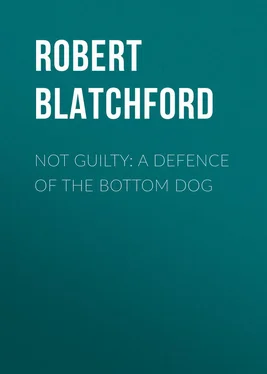Robert Blatchford - Not Guilty - A Defence of the Bottom Dog
Здесь есть возможность читать онлайн «Robert Blatchford - Not Guilty - A Defence of the Bottom Dog» — ознакомительный отрывок электронной книги совершенно бесплатно, а после прочтения отрывка купить полную версию. В некоторых случаях можно слушать аудио, скачать через торрент в формате fb2 и присутствует краткое содержание. Жанр: foreign_antique, foreign_prose, на английском языке. Описание произведения, (предисловие) а так же отзывы посетителей доступны на портале библиотеки ЛибКат.
- Название:Not Guilty: A Defence of the Bottom Dog
- Автор:
- Жанр:
- Год:неизвестен
- ISBN:нет данных
- Рейтинг книги:3 / 5. Голосов: 1
-
Избранное:Добавить в избранное
- Отзывы:
-
Ваша оценка:
- 60
- 1
- 2
- 3
- 4
- 5
Not Guilty: A Defence of the Bottom Dog: краткое содержание, описание и аннотация
Предлагаем к чтению аннотацию, описание, краткое содержание или предисловие (зависит от того, что написал сам автор книги «Not Guilty: A Defence of the Bottom Dog»). Если вы не нашли необходимую информацию о книге — напишите в комментариях, мы постараемся отыскать её.
Not Guilty: A Defence of the Bottom Dog — читать онлайн ознакомительный отрывок
Ниже представлен текст книги, разбитый по страницам. Система сохранения места последней прочитанной страницы, позволяет с удобством читать онлайн бесплатно книгу «Not Guilty: A Defence of the Bottom Dog», без необходимости каждый раз заново искать на чём Вы остановились. Поставьте закладку, и сможете в любой момент перейти на страницу, на которой закончили чтение.
Интервал:
Закладка:
But as to the beginning of the social virtues I was puzzled.
In most religions morality is supposed to have been established by divine revelation. Men did not know right from wrong until God gave them codes of laws ready-made; and even after men had the divine laws given to them they were by nature so depraved that they could only obey those laws by the special grace of God.
The idea that morality was slowly built up by evolution was first given to the world by Spencer and Darwin. It has since been elaborated by other writers, notably by Winwood Reade and Prince Kropotkin.
The notions of "the struggle for existence" and "the survival of the fittest" have been too commonly taken to mean that life in the animal world is one tragic series of ruthless single combats; that every man's hand always was and ever must be against the hand of every man, and every beast's tooth and claw against the tooth and claw of every beast.
But if we read Darwin's Descent of Man and Prince Kropotkin's Mutual Aid Among Animals and Winwood Reade's Martyrdom of Man , we shall find that the law of natural selection does not favour any such horrible conclusions.
Self-preservation may be the first law of nature; but it is not the last law of nature. In union is strength. The gregarious animals – those which live in communities of flocks and herds – as the apes, the deer, the rooks, the bees, the bison, the swallows, and the wolves, gain by mutual aid in the struggle for existence, for, by reason of their numbers and their union, they are better able to watch for the approach and to defeat the attacks of their enemies.
From this union and mutual aid of the gregarious animals arose the social instincts.
The sociable animals would doubtless be first drawn together partly for safety and partly for company.
Sheep, deer, buffalo, wild dogs, ants, rooks, and other social animals enjoy the companionship of their own kind. They play together, feed together, sleep together, hunt together, and help each other to evade or resist their common foes. They share in social pleasures, and practise some of the social virtues.
And as the more sociable animals would be safest, and the less sociable animals most exposed to danger, natural selection would tend to raise the level of sociability, because the stock would be bred more from sociable than from unsociable animals.
The apes are social animals, and also imitative animals. The ape-like forbears of man would unite for safety and for society, and, being imitative, would observe and copy any invention or discovery due to lucky accident or to the sharper wits amongst their number.
Like the lower animals, they would play together, feed together, fight in companies, defend or rescue their young, and post sentinels to watch for the approach of danger.
Long before man had thought of any ghost or God, some rude form of order and morality would exist in the families and tribes of men, as some rude form of order and morality exists to-day amongst the wild elephants, the bees, the deer, and other creatures.
I once saw two horses fighting in a field. A third and older horse came up and parted them, and then drove them away in opposite directions. So in the earliest human tribes would the leaders prevent brawling and exact obedience.
Partly from such action, and partly from the training of the young, would be formed the habit of resenting and of punishing certain unsocial acts which the herd or tribe felt to be opposed to the general welfare.
One of the first faults man would brand as immoral would be cowardice. One of the earliest moral laws would, perhaps, resemble the Viking law that men who proved cowards in battle should be buried in the swamp under a hurdle.
Imitation, habit, natural selection, and the love of approbation, would all tend to fix and improve these crude customs, and from these simple beginnings would grow up laws and morals and conscience.
Very likely the earliest human groups were family groups, or clans. These clans would fight against other clans.
The next step may have been the union of clans into tribes, and the next the banding of tribes into nations.
At present men are mostly united as nations. Each nation has its own laws, its own morality, and its own patriotism, and the different nations are more or less hostile to each other; as formerly were the tribes or clans.
The final triumph will be the union of the nations in one brotherhood, and the abolition of war.
The red Indian does not think it immoral to murder an Indian of another tribe. The European does not think it immoral to kill thousands of men in battle. The evolution of morality has not yet carried us as far as universal peace. Nor has any revelation of God forbidden war.
We do not need to think long, nor to look far to see that different conditions have evolved different moral codes.
But all morals may be divided into two classes: True Morals and Artificial Morals.
True morals are all founded on the rule that it is wrong to cause needless injury to any fellow-creature.
Artificial morals are those morals invented by priests, kings, lawyers, poets, soldiers, and philosophers.
Moral codes made by rulers, or by ruling classes, are generally founded on expediency; and expediency, as understood by the rulers or the ruling classes, usually means those things that are expedient for themselves.
Now that which is expedient for a king, a tyrant, or an aristocracy may be far from expedient for the people over whom they rule. So we need not be surprised to find that many of the laws of barbarous and civilised nations are immoral laws. Our British game laws, land laws, poor laws, and very many of the criminal laws, and the laws relating to property, are immoral laws.
But there is no revelation of God condemning those laws. Nor does any European church oppose those laws, nor denounce them as immoral.
Then as to public opinion – our unwritten moral code – there is no clear and logical system of moral principles. For instance, the public think it a pity that men should be out of work, that women should starve, that little children should be sent to school unwashed and unfed. But the public do not think these things immoral. The fact is, the British people, after more than a thousand years of Christian teaching, do not know what true morality is. And how should they know, when their teachers in the church do not know?
The churches have always drawn their morality from the Bible, and have always tried to fit it in with the immoral codes made by kings, soldiers, landlords, money-lenders, and other immoral persons.
The Church has often pleaded for "charity" to the poor, but has never come to the rescue of the "Bottom Dog"; because the churches have never understood morality nor human nature.
It is science, and not the revelation of God, nor the teaching of priests, that has enabled us to begin to understand human nature, and has made it possible to build up a systematic code of true morality.
As to what morality is, I claim it is the rule of social conduct: the measure of right conduct between man and man; and I shall build up my whole case upon the simple moral rule that "every act is immoral which needlessly injures any fellow-creature." This rule is only an old truth in a new form. It is, indeed, just a modern reading of the "Golden Rule." It is not the rule itself, but the use I shall put it to, that is likely to flutter certain moral dovecotes. As to the rule, the teachings of most great moralists, of all times and nations, go to prove it. As, for instance:
Lao Tze, a Chinese moralist, before Confucius, said: "The good I would meet with goodness, the not-good I would also meet with goodness."
Confucius, Chinese moralist, said: "What you do not want done to yourself, do not do to others."
Читать дальшеИнтервал:
Закладка:
Похожие книги на «Not Guilty: A Defence of the Bottom Dog»
Представляем Вашему вниманию похожие книги на «Not Guilty: A Defence of the Bottom Dog» списком для выбора. Мы отобрали схожую по названию и смыслу литературу в надежде предоставить читателям больше вариантов отыскать новые, интересные, ещё непрочитанные произведения.
Обсуждение, отзывы о книге «Not Guilty: A Defence of the Bottom Dog» и просто собственные мнения читателей. Оставьте ваши комментарии, напишите, что Вы думаете о произведении, его смысле или главных героях. Укажите что конкретно понравилось, а что нет, и почему Вы так считаете.












